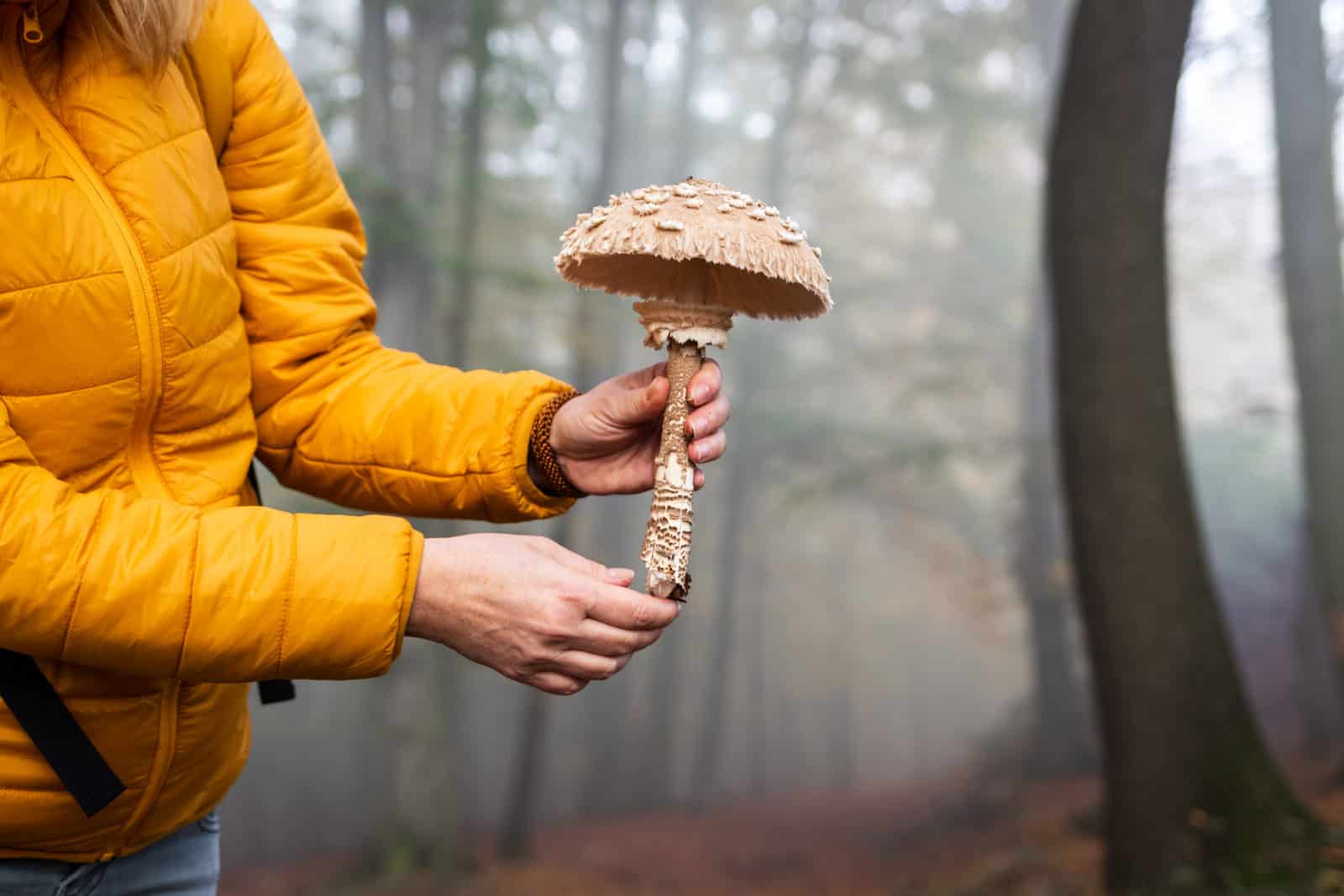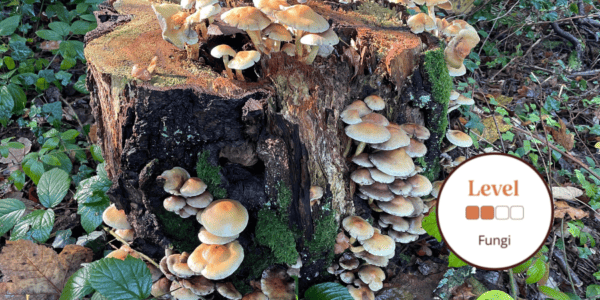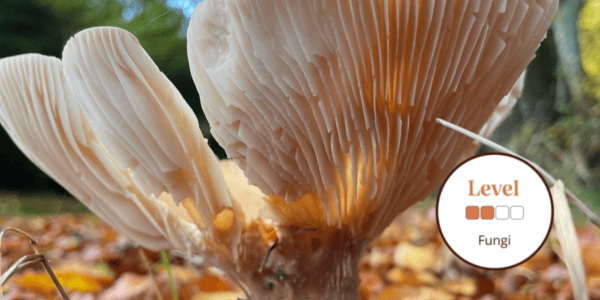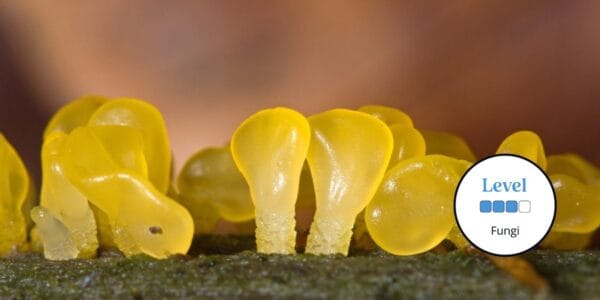This beginner fungi course is primarily aimed at those who want to know more about the wonderful world of fungi and build their knowledge of what kinds of things they might find in their local area during autumn.
Looking at habitat, substrate, and how the fungus interacts within a woodland habitat are skills that will allow you to build your knowledge of woodland fungi.
This course will focus on the more common groups of fungi and how to use macro features in the field to help make a confident identification to as high a level as possible. We will discuss how to take your identification skills further but for this course, we are not going to be using microscopy, however, a good quality hand lens (x20-30) will be useful. Along the way, we will discuss the role of fungi in the wider ecosystem, their threats, conservation and how to act sustainably, and some stories about these sometimes weird and always wonderful things.
There will be classroom-based sessions but the majority of learning will take place out in the beautiful countryside surrounding Flatford Mill. As such participants will need to have a reasonable level of fitness and have suitable clothing for being out in all weathers for several hours at a time. You must also be prepared to peer closely at small fungi growing on damp woodland floors!
You will spend your course amidst the quintessentially English countryside of the Dedham Vale in Suffolk situated on the banks of the River Stour.
Please Note: There is no accommodation provided with this course. If you would like to book accommodation, lunch and an evening meal at Flatford Mill, please email [email protected]
Bookings will close sooner if course capacity is reached
Get to know some more about the wonderful world of fungi and identify some of the common (and occasionally less common) species that can be found during Autumn.
Who Should Attend?
Nature enthusiasts, Students, Rangers, Early career ecologists.
Knowledge Level
Beginner. Level descriptors can be found on the following webpage: Framework and Course Level Descriptors
Prior Knowledge
No existing knowledge, or experience is needed for this course. Just a willingness to explore and learn.
This course will cover:
-
- Common groups of fungi with a focus on autumnal species
- Identifying species using macro features and keys
- Range of classroom and field sessions
By the end of the course, you will be able to:
-
- Identify the most common groups of fungi and some individual species using macro features
- Use a range of fungi guides to identify species
- Explain how to study fungi sustainably
The course gives you the opportunity to immerse yourself in a new subject and acquire novel skills. Our fantastic tutor will combine the use of classroom-led learning and outside learning opportunities to give individuals the skills and confidence to progress their learning.
-
- See the ‘Example Timetable’ and ‘What’s Included’ sections below for more information about this course.
- Upon booking you will need to provide individual details of all attendees
- Please email [email protected] if you have any questions.
Group Bookings Made Easy
If you have a group of 10 or more individuals wanting to complete one of our courses, our team are available to discuss your options – from discounts to private team courses.
-
- Discounted rates
- Privately run courses for your group
- Bespoke courses developed specifically for your needs
If we are unable reach viable numbers for this course, we will inform you of the course cancellation 14 days prior to the course run. We would recommend when purchasing accommodation and/or travel you should take out your own insurance.
Tutor: Chris Ford
Chris Ford has worked in environmental education for 15 years, working at in the London Region at Juniper Hall and Bushy Park and at the Blencathra Centre in the Lake District National Park. He is now working for the RSPB on the Suffolk Coast at RSPB Minsmere Nature Reserve and continuing to share his love for the natural world from wildflowers to wading birds and invertebrates to interesting fungus. When he isn’t working Chris is often out on his bike or out in the garden but always with an eye out for anything interesting that might be spotted nearby.Accommodation
The course fee is for tuition only. If you would like to stay at the centre you can book accommodation here Please note rates are Room Only. The centre will contact you direct after they receive your booking to confirm. You can then liaise with them regarding any meals you may require, which will be at an additional charge.
Book with Confidence
We understand the difficulties of making plans in the current situation when guidelines continue to change, and insurance conditions are being tightened. In response, we will continue to offer additional flexibility. Find out more here
Example Timetable
Example Timetable
This timetable is subject to change but should give a clear outline of what to expect
- Please arrive in time for the course to start promptly at 10:00am
- The course will end at 5:00pm.
Day 1
| 10:00am | Introductions |
| 10:15am | Introduction to fungi, common groups, terminology and techniques |
| 11:30am | Break - refreshments not provided |
| 11:45am | Field session |
| 12:30pm | Lunch - not provided |
| 1:30pm | Continued field session |
| 3:30pm | Review our findings and use keys to identify found species. |
| 5:00pm | Finish |
Please note accommodation, refreshments and an evening meal are not included
Day 2
| 10:00am | Recap of day 1 |
| 10:15am | Features of more different groups of fungi |
| 11:30am | Break - refreshments not provided |
| 11:45am | Field session |
| 12:30pm | Lunch - not provided |
| 1:30pm | Continued field session |
| 4:30pm | Classroom plenary |
| 5:00pm | Finish |
What's Included
The course has been carefully created by expert tutors and educators to help you continue to build and develop your knowledge and apply it within the field surrounded by like-minded individuals.
The course includes:
- Classroom learning covering the theory of the species
- Field excursions to apply new knowledge
- Expert tuition for which the Field Studies Council is renowned
- Clear objectives and progression
You can rest assured that the absolute best content from an expert in environmental education will be provided. In choosing a Field Studies Council course, you will be joining thousands of people who learn with us each year.
Reviews
-
★★★★☆
The other people on the course were enthusiastic beginners like myself, which meant that the course was tailored to our level. Very good interaction with the course tutor. No complaints. Overall an excellent course.
-
★★★★☆
The other people on the course were enthusiastic beginners like myself, which meant that the course was tailored to our level.
-
★★★★☆
Good visual handouts, engaging speaker, lovely rambles. Course was great Great fun, lovely atmosphere
Before You Attend
What to Bring
- Notebook and pencil
- Lunch and refreshments
- Sensible footwear and clothing for being outdoors
If you have them
- Hand lens
- Penknife
- Any up to date field guide to fungi
There will be a member of staff with first aid training and access to a first aid kit on site. If you have special medical or access requirements, please let us know as soon as possible so we can plan the course.
Sorry this course booking is closed




